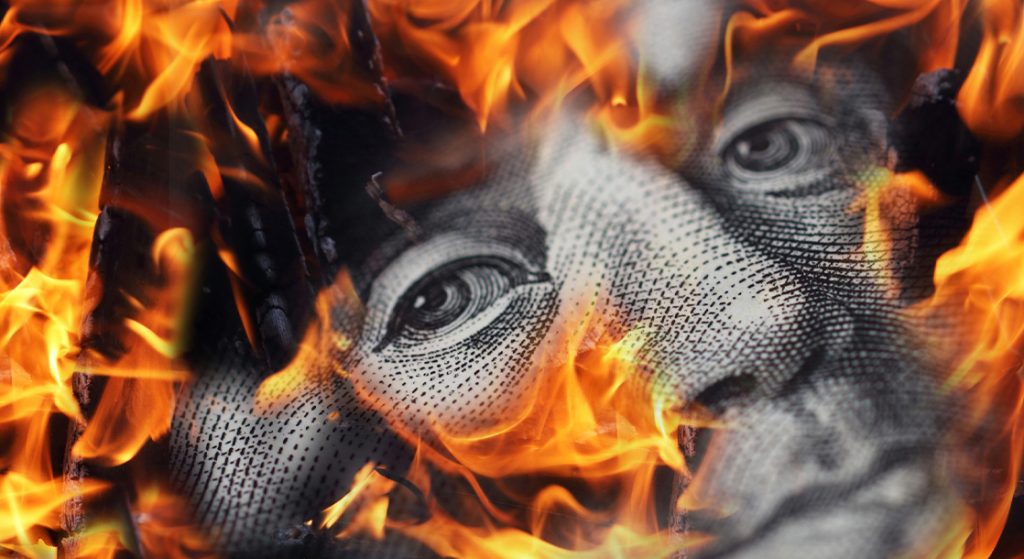In 1944, as Europe sat devastated by the ongoing world war, hundreds of delegates from all 44 allied nations met in Bretton Woods, USA. Here they would decide the future of the world financial system, a future in which the USA, left mostly unscathed by the war, would dominate –– or more specifically, the US dollar would.
Bretton Woods is notable for the pegging of other currencies to the US dollar – backed by the USA’s vast gold reserves at the time –– and the creation of the International Monetary Fund and World Bank (then named the International Bank for Reconstruction and Development). Though delegates from the USSR attended the conference, they did not ratify the final outcome, recognising these new institutions as tools of the western capitalist.
Now, the era of Bretton Woods did not last of course, coming apart some years before I and many of our comrades were even born. Yet the influence of the dollar did not die with this system; the IMF and the World Bank still stand, and the US dollar continues to play a large, and most often destructive, role in every part of the world it touches.
Around 59% of global foreign exchange reserves continue to be held in US dollars (though this is certainly a decline from the 70% figure two decades earlier), and a number of countries list the dollar as an official currency, including Ecuador, Panama, and El Salvador.
Though the dollar still maintains a significant role in global finance, this has by no means gone unchallenged. In South America, the countries of the Bolivarian Alliance (ALBA) had previously introduced a shared currency, to end dollar dependency in the region. The Sucre, proposed by Hugo Chávez, was adopted in 2009 by Bolivia, Cuba, Ecuador, Nicaragua, and Venezuela, with Sucre standing for ‘Unified System for Regional Compensation’.
However, this new currency fell into decline rather quickly, following the death of Hugo Chávez, the worsening economic situation of Venezuela under US sanctions, and the victory of Lenín Moreno in Ecuador, who removed Ecuador from ALBA.
There has also been the proposals of Muammar Gaddafi, to introduce a shared currency for Africa, backed by gold. Such a system was never established, of course, with the illegitimate NATO intervention in Libya, that saw Gaddafi murdered and Africa’s richest country completely destabilised.
This attempt to set up an African central bank was a clear concern for the French and US establishments going into the intervention, with Sidney Blumenthal telling Hillary Clinton “French intelligence officers discovered this plan shortly after the current rebellion began, and this was one of the factors that influenced President Nicolas Sarkozy’s decision to commit France to the attack on Libya.” (This written in one of Clinton’s many leaked emails).
These attempts are by no means the end of the fight against US dollar dependency. Only this year, former Brazilian President Luiz Inácio Lula da Silva proposed that, should he retake power in this year’s elections, he would introduce a South American shared currency. The Sur, meaning South, would serve not to replace existing national currencies in the continent, but be used for trade between the countries. Under these proposals, initial capital for the new South American central bank would be raised by member countries, proportional to their share of trade.
Further to this, just a few weeks ago, Iran’s Deputy Foreign Minister for Economic Diplomacy, Mehdi Safari, revealed the Iranian government had sent a letter to the Shanghai Cooperation Organisation (SCO), proposing a shared currency for member states. Iran joined the SCO as a full member last September, having previously been an observer. The organisation now boasts China, Russia, India, Iran, Kazakhstan, Kyrgyzstan, Pakistan, Tajikistan, and Uzbekistan, as full members. Tehran’s suggestion is set to be adressed at the SCO’s next summit, in Uzbekistan this September.
One must hope that these new currency proposals succeed where past attempts have failed, in facilitating the decline of US dominance and the rise of a multipolar world. Such a development would not only be a blow to the financial interests of US oligarchs, but help undermine the unilateral sanctions placed by the USA upon countries such as Venezuela, Iran, and China.
Mia English, is a member of the YCL’s Birmingham branch




